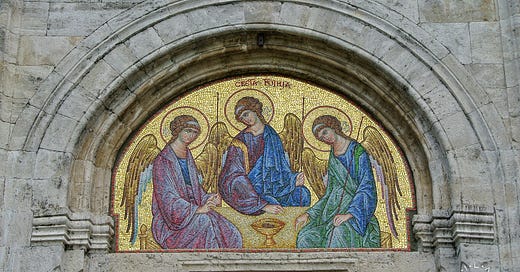How to talk about the divine processions without confusion: The guide to explaining the difference between cause and principle
Succeed with 12 helpful examples
The distinction between cause and principle is subtle but important and real. It is especially crucial for understanding the Trinitarian processions because if the Son proceeds from the Father, then the Father is the principle or origin of the Son. Hence, Our Lord says, "From God I proceeded" (Jn. 8:42). If the Holy Spirit proceeds from the Father and the Son, then the Father and the Son are the origin or principle of the Holy Spirit.
But how are we supposed to understand those statements without thinking of one divine person causing another? St. Thomas says: “Some have understood it (processions) in the sense of an effect, proceeding from its cause; so Arius took it, saying that the Son proceeds from the Father as His primary creature, and that the Holy Ghost proceeds from the Father and the Son as the creature of both. In this sense neither the Son nor the Holy Ghost would be true God.”1
This, of course, is problematic. The key, then, is properly distinguishing the meanings of cause and principle.
By cause, we mean is that upon which something depends for its being or coming to be. For example, an engine and wheels are causes of a car because a car depends on them for its existence. Likewise, an architect is a cause of a building, nourishment is the cause of eating food, and so forth, because the effect depends on the cause for its existence or coming to be.
For causality, there is a relationship of dependency on the level of being or becoming.
Hence, St. Thomas says: “cause is said only of that primarily from which the existence of the posterior follows. Hence we say that a cause that from whose existence another follows.”2
What about principle?
St. Thomas says this about principle or origin: “that which is primary, whether the existence of a posterior follows from it or not, can be called a principle.”
Principle is wider in meaning than “cause” because it abstracts from or is agnostic to the relation of causal dependency, although it is open to it.
All causes, then, are origins but not all origins are causes. The truth of the statement can seen be from the fact that a “cause and effect” sort of relationship is only one of many kinds of “before and after” relationships (There are at least 5. Cf. Aristotle’s Categories).
Origin, then, just means a beginning of an order or a starting point. And order, for our purposes, means any kind of distinction of before and after. This will become clearer in our examples.
12 Examples of Origin or Principle without causality:
Examples from Time:
Morning is a principle of evening
Day is a principle of Night
Neither is the cause of the other (The rotation of the earth is the cause of both day and night)
Examples from Place:
Left is a principle of right
Right is a principle of Left
Neither is the cause of the other (The mind is the cause of a left-right relationship)
The beginning of the road is the principle of the end of the road, but not its cause.
Walking is the cause of being at the end of the road
Asphalt is the cause of both the beginning and end of the roadNot being in Rome is a principle of being in Rome, but not a cause.
Traveling to Rome is a cause of being in Rome
Examples from Change:
Ignorance is a principle knowledge, but not a cause of it.
Studying is a cause of knowledge. Ignorance is a cause of mistakes.
Vice is a principle of virtue, but not a cause of it. Good actions are a cause of virtue. Vice is a cause of unhappiness.
Life is a principle of death, but not a cause of it. Disease is a cause of death. Life is a cause of growth.
Hot is a principle of cold but not a cause of it. Ice is a cause of coldness and fire is a cause of a melting.
Examples from Math
The origin point is a principle of X axis and the Y axis but not the cause of it. A construction is the cause of the x and y axis. The origin is a cause of knowledge
Point A is a principle of the line AB, but not the cause of it. Constructing a line from point A to point B is a cause of line AB
Examples from Grammar
The letter A is a principle of letter B, but not the cause of it. Language is a cause of letter B. The letter A is a cause of the word CAT
In all the examples, there is a relationship of before and after, i.e. an order, but not one of causality. A principle is not necessarily a cause, although a cause is always a principle.
When one hears origin or principle, sometimes it is helpful to substitute “presuppose” or “starting point” to distinguish it from cause in our minds.
E.g. Hotness cannot cause coldness but can be a principle or starting point of it.
E.g. Life is not a cause of death but a principle of it.
E.g. Nor is death a cause of life but a principle of it.
E.g Day is not the cause of night but what is presupposed for it.
So too, the Father is not a cause of the Son but a principle of the Son. And so on for the other processions.
To explain the Trinitarian processions, it is clear by now that the distinction between cause and principle is indispensable.
ST I q. 27 a.1
De Principiis Naturae Ch. 3



